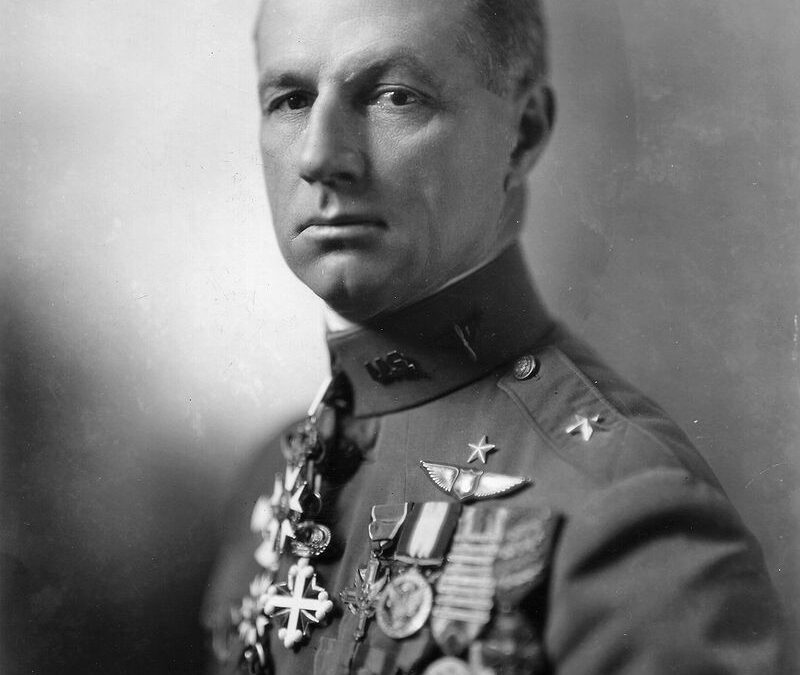Illustrated by the Navy Establishment Moving Over for Airpower
In the early days of the airplane, few predicted it would ever play a part in warfare. Early models were fragile – canvas and wood held together by wire and powered by lawnmower-sized engines. Pilot and passenger sat in the open air, with leather helmets and goggles.
Navy admirals with their enormous battleships and army generals with their rows of cannons saw little merit in frail flying machines. To the military establishment, war was about amassing the brawny steel might of the industrial revolution. Battleships – the most expense weapons in the American arsenal — were floating behemoths, bristling with strength and firepower. Powerful manufacturing, financial and political interests had a heavy investment in the status quo. Real men believed in battleships and artillery. Fluttering canvas and wood threatening nations? About as likely as sparrows overwhelming castles.
But a visionary named Billy Mitchell saw the future of flight. Handsome, articulate, the son of a wealth United States senator, Billy experienced that his planes could leap over enemy lines and attack the opponent’s vital centers – the industries that produced the bombs and bullets necessary for warfare. This to choke off the enemy’s ability to fight. Having watched murder in the mud of trench warfare – wholesale slaughter – a million men dying at the battle of Somme in World War I and the lines only moved 200 yards – Billy saw the airplane as a way to shorten war and actually make it more humane.
Billy was sure warfare had changed forever. Warriors accustomed to thinking in two dimensions – land and sea – had to understand the third dimension – air (much liked the Arctic and space are the new frontiers today). With a chest full of medals and a swashbuckling personality, Billy Mitchell came home from World War I to preach about airpower. He offended people, brashly telling them battleships were outmoded floating scrap metal.
Mitchell’s ideas were heresy to the traditionalists. He was a convincing speaker and gained a lot of attention, but he was also an officer in the military, and as such was subject to orders from the top. When told to tone it down, and stand down he took his case to the American people.
The Air Prophet convinced the navy to put his ideas to a very public test. The captured German battleship Ostfriesland was considered a solid, stable ship by old-line American admirals. A newspaper, The Washington Star, described her as “. . . a wonderful ship, built to be as nearly unsinkable as possible.” It had four skins to protect her against mines and torpedoes and heavy projectiles. She was divided into many watertight compartments by bulkheads, so that no matter how many big holes were made in her hulls, she would still be able to get home.
On July 21, 1921, some 300 notables – cabinet officers, senators, military attaches of foreign powers, aeronautical and naval experts and 50 newspaper reporters — waited aboard an observationship in the Atlantic. Secretary of the Navy Joe Daniels had stated publicly that he would be happy to stand bareheaded on the deck of any ship Billy was trying to sink from the air. Mitchell was ridiculed, and made fun of by navy officers.
Billy instructed his fleet of bombers. Each carried no more than two thousand pounds of explosives. At 12:19 P.M. they dropped their first bomb. Twenty-one minutes into the trial, the ship vanished beneath the surface.
The brass was stunned. Shocked. It was the end of an era, and many were not happy to move over.
And when Paul urged grace, it was the end of an era, and many were not happy to move over. For centuries keeping the law was the acknowledged and accepted badge of spirituality. Because we were not raised in such a legalistic religion, we have little appreciation for what a shock this was to the Jews. Adjustments were difficult. People likely felt guilty for ceasing to do what they had been taught was spiritual all their lives.
Law was moving over for grace. Slowly. And at great cost. Billy Mitchell was eventually court marshalled and died a broken man. Paul also paid a great price, but he was willing to spend and be spent to advance grace.
Source: James Bradley, Fly Boys

Thank you for your investment in so many lives dear Keith and Marilyn. Have you successfully moved now? Send us your new address. Susanna and I would like to send you a house warming gift…
You’re a great blessing for the Body of Christ. May that fact fill you with his Comfort.
Your friend,
Thomas
Thomas Smoak International Director +16308910243 Action International
http://www.actioninternational.org
>